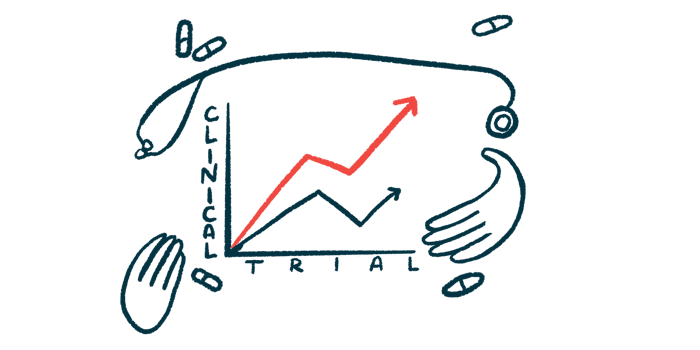Add-on danicopan found to help control anemia in PNH trial
New data show benefits for up to 48 weeks for adults on Alexion oral therapy
Written by |

Danicopan, an experimental oral medication, continued to help control anemia when taken for up to 48 weeks by adults with paroxysmal nocturnal hemoglobinuria (PNH) who experience a breakdown of red blood cells outside of blood vessels — called extravascular hemolysis — despite being on a C5 inhibitor.
That’s according to new data from the Phase 3 ALPHA (NCT04469465) clinical trial and part of its extension period, which showed that add-on danicopan also continues to raise hemoglobin — the protein that carries oxygen in red blood cells — toward near-normal levels.
Developed by Alexion, AstraZeneca Rare Disease, danicopan is under regulatory review in the U.S. and Europe. For patients, adding danicopan to Ultomiris (ravulizumab) or Soliris (eculizumab) could mean better quality of life and less fatigue, according to researchers.
Trial results were shared at the 65th American Society of Hematology (ASH) Annual Meeting and Exposition, in San Diego, last month, per a company press release.
ALPHA trial testing safety, efficacy of danicopan in PNH patients
In PNH, the immune system’s complement cascade becomes overly active and leads to hemolysis, the breakdown of red blood cells. As a result, patients experience anemia, which refers to low numbers of red blood cells and hemoglobin.
Both Ultomiris and Soliris block a complement protein called C5. While this helps to prevent intravascular hemolysis, or IVH — the destruction of red blood cells inside blood vessels — as many as 1 in 5 patients continue to experience anemia. That’s due to extravascular hemolysis, or EVH.
Administered as an oral tablet, danicopan is designed to target factor D, another protein of the complement cascade. Because factor D lays upstream of C5 in the complement cascade, danicopan is expected to help prevent extravascular hemolysis in patients on C5 inhibitors while still enabling adequate control of intravascular hemolysis.
“Unlike IVH, EVH is not life-threatening, but its manifestations can be burdensome for people living with this condition,,” said Gianluca Pirozzi, MD, Alexion’s senior vice president and head of development, regulatory, and safety.
That, Pirozzi said, is “why we continue to explore the potential of the complement system to advance patient care.”
According to Austin Kulasekararaj, MD, an investigator in the ALPHA trial, these findings highlight danicopan’s promise as a first-in-class therapy.
“These new data further demonstrate the potential of danicopan as add-on to Ultomiris or Soliris to address the needs of the small subset of patients with PNH who experience clinically significant EVH,” Kulasekararaj said.
The ALPHA trial is testing how safe danicopan is and how well it works to keep anemia under control. It involves 86 adults with a diagnosis of PNH who experience clinically significant EVH despite receiving treatment with Ultomiris or Soliris.
The participants were randomly assigned to receive 150 mg of danicopan or a placebo three times daily on top of a standard Soliris or Ultomiris regimen for 12 weeks, or about three months. After that, they could enter an open-label period in which all received danicopan as an add-on treatment for an additional 12 weeks. Patients then had the option to enter a long-term extension phase in which they continue the therapy for up to two years.
Danicopan showed improvements in hemoglobin levels for up to 11 months
Improvements in hemoglobin levels observed at 12 weeks (by 2.94 g/dL) were sustained at 24 weeks (by 3.17 g/dL), and through 48 weeks in patients treated with danicopan on top of Ultomiris or Soliris.
The mean levels of lactate dehydrogenase — a sign that red blood cells may be damaged— were sustained from the beginning of the study up to 48 weeks in both treatment groups, indicating successful management of terminal complement activity and IVH with either Ultomiris or Soliris.
Other trial goals, such as absolute reticulocyte count levels and the percentage of patients who avoided transfusion, continued to show superiority in patients who received danicopan at 24 weeks. These measures also showed meaningful improvement at 24 weeks in patients who switched from the placebo to add-on treatment with danicopan.
The absolute reticulocyte count measures the number of reticulocytes — immature red blood cells — in a given volume of blood. Monitoring this parameter is important in PNH because it helps assess the bone marrow’s response to the loss of red blood cells due to the destruction of red blood cells.
“Expanding on positive 12-week results, the findings demonstrate sustained improvements in haemoglobin levels for up to 48 weeks, while also maintaining disease control, as measured by lactate dehydrogenase levels,” said Kulasekararaj, who is a consultant hematologist at King’s College Hospital, in London.
Danicopan demonstrated a favorable benefit-risk profile with no deaths, meningococcal [bacterial] infections, or discontinuations due to hemolysis.
Overall, the therapy was well tolerated. Among the 80 patients who took at least one dose of danicopan, the most common side effect was COVID-19, in 21.3%, followed by diarrhea and headache, each affecting 15% of participants. Fever was a side effect for 13.8% of patients, nausea for 12.5%, and fatigue for 10%.
“Danicopan demonstrated a favorable benefit-risk profile with no deaths, meningococcal [bacterial] infections, or discontinuations due to hemolysis,” the researchers wrote in an abstract detailing the data from part of the extension period of the ALPHA trial.
An analysis of patient-reported outcomes revealed that taking danicopan on top of Ultomiris or Soliris improved quality of life and eased fatigue for up to 24 weeks. Those who switched to danicopan from a placebo also improved “to levels similar to those of the general public,” the researchers wrote in a second abstract.
For Pirozzi, targeting both C5 and factor D “may be an optimal treatment approach for the 10-20% of patients with PNH who experience clinically significant EVH.”
‘”Importantly, C5 inhibition maintains effective IVH control, which is critical for patients, and … factor D inhibition addresses signs and symptoms of EVH,” Pirozzi said.







